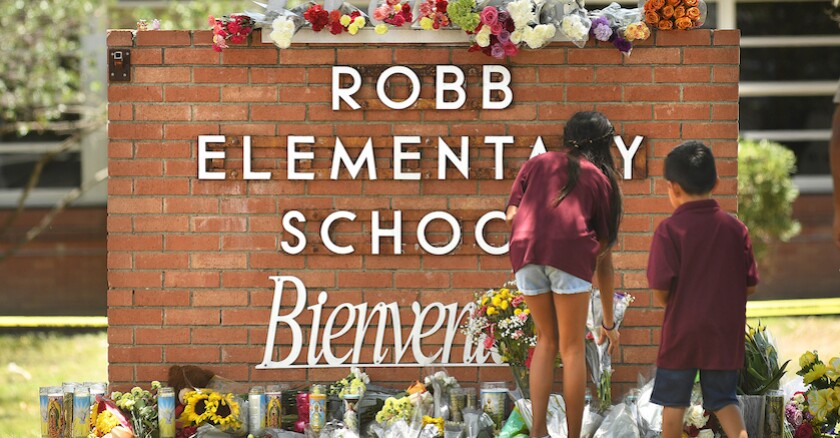The plan, though not finalized, would bolster mental health for children, improve school safety and give bulletproof shields to school police officers.
For more than a week, Texas House Speaker Dade Phelan, R- Beaumont, and Lt. Gov. Dan Patrick have engaged in unusually public dickering over the timing and content of an emergency fund transfer to pay for the initiatives.
Neither GOP leader is proposing gun restrictions in the wake of a teen gunman’s use of an AR-15 to fatally shoot 21 people in two Uvalde fourth grade classrooms.
Gov. Greg Abbott, who has let Patrick and Phelan and their Republican-controlled chambers take the lead on a response, has applauded their progress toward a deal. Democrats are saying it should include, at a minimum, raising the age on purchase of assault-style rifles to 21, from 18.
The emerging deal would spend nearly $188 million, with much of it coming from the main school-aid program, which because of rising property values has a higher state appropriation level than required.
Within the highest ranks of the GOP, Phelan and Patrick, who ended last year’s session in a public feud, offered potential sweeteners to each other. Each leader glommed onto the other’s previous proposal, before making additional spending proposals.
Late Monday, Patrick spokesman Allen Blakemore downplayed any remaining disagreements, which included Patrick’s reluctance to immediately endorse two of Phelan’s five mental-health proposals, though he blessed three others.
The as-yet unapproved Phelan items included $30 million to pay market rates to expand the state’s ability to place mentally ill children in community mental health hospitals and $13.5 million to create mobile crisis-intervention teams for youth and families in each region.
“He agrees with the items,” Blakemore said of Patrick. “He just didn’t want to go ahead today. … We could be funding this stuff by next week. It’s just there are things that members [of the Senate ] want to weigh in on.”
Phelan is expected to press for the money for the additional hospital beds and mobile units – in part because on his most recent visit to Uvalde, local elected officials told the speaker that their top priority, even before the shooting, was getting a community mental health hospital.
The speaker’s mental health initiatives, as his letter to Patrick outlining them Monday hinted of, could help the state’s much-criticized foster care system.
In January, a panel of three national child-welfare experts recommended to Abbott and two state agencies that also are defendants in a class-action lawsuit additional state and federal spending on mental health. The experts, asked how to solve a bed shortage for foster children, urged preventive measures that would help keep children with their birth families.
Houston lawyer Paul Yetter, the lead counsel for 10,000 children in long-term foster care, said lawmakers must no longer “ignore” the gap between demand for mental-health services and Texas’ skimpy supply.
“There’s a mental health crisis among young people in Texas , and none are suffering more than our foster children,” he said. “It’s time for the Legislature to fund critical mental health care programs so these children can get the help that they need.”
Last week, it appeared for a brief time that in the wake of the Uvalde gun massacre, Patrick and Phelan might resume trading elbows, as they had late last year. The 2021 dispute mostly involved Patrick’s use of former President Donald Trump as an outside but powerful force applying pressure on Abbott and Phelan for more audits of the 2020 election and tougher penalties for vote fraud.
On June 3, Patrick issued a statement calling on Phelan and other House leaders to join him and top senators in a “budget execution letter” that would shift $50 million in the state budget to start buying ballistic shields for school law enforcement officers.
“We cannot wait for another school year to begin to better-equip our police who respond to these attacks,” Patrick said.
Initially, Phelan responded in a lukewarm way, saying he wanted to see how the investigations of the shooting at Robb Elementary played out.
But on Monday, the two GOP legislative leaders complimented one another in letters released about eight hours apart.
“Your recommendation to dedicate $50 million toward outfitting local school law enforcement with bulletproof shields is a worthwhile goal to that end, and you have my full support in that endeavor,” Phelan wrote Patrick.
The lieutenant governor responded warmly, saying paying for shields for all 80,000 police officers in the state would have to be part of the leaders’ starting point budget when lawmakers convene in January.
Patrick added that “there are indeed several items that you have outlined that will also require budget execution to ensure that we are prepared for a return to school in August.”
He agreed to Phelan’s request to immediately provide $37.5 million to expand a school telemedicine program that seeks to identify children and adolescents with behavioral health needs; $4.1 million to add as many as seven “multisystemic therapy teams,” which provide family therapy, to the seven that exist now; and $950,000 to add two coordinated specialty care teams, including one for the Uvalde area, to the 37 that exist statewide. The teams help treat youth experiencing a first episode of psychosis.
Patrick also endorsed $32.7 million of Phelan-proposed items on school safety, including providing silent panic alert systems that connect directly to law enforcement.
The lieutenant governor then upped the ante, proposing to spend $14 million that hasn’t been spent from a $100 million school hardening initiative approved in 2019 and $5 million more on the state police-managed “fusion centers” that, among other things, help identify possible threats to school security.
“We also need further funding of automatic locking doors that have alarms when opened, and metal detectors, which have proven effective at Santa Fe High School in the aftermath of the shooting there,” Patrick wrote.
©2022 The Dallas Morning News. Distributed by Tribune Content Agency, LLC.







